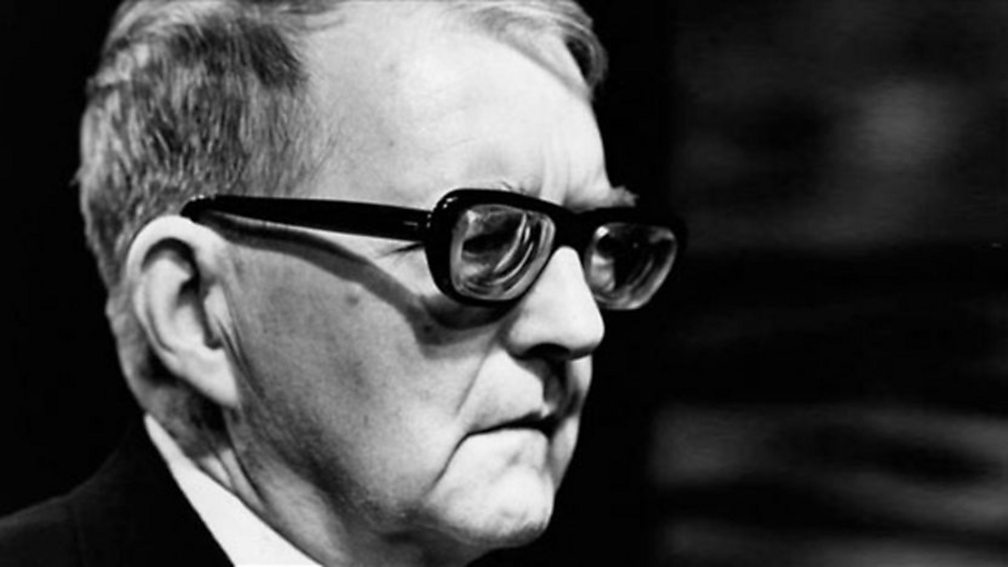Schostakowitsch starb am 9. August 1975 an einem Herzinfarkt. Unter den vielen Kränzen, die das Grab schmückten, war auch einer des KGB.
Er wurde auf dem Nowodewitschi-Friedhof in Moskau bestattet.
Programme notes by Marianna Kankare-Loikkanen:
The year 1975 marked the 500th anniversary of one of the great artists of the Renaissance, Michelangelo Buonarroti. He was not only a brilliant sculptor but also a philosopher who viewed society around him with a critical eye and recorded his sentiments in the form of spontaneous poetry sketches in his diary and letters, sometimes even on his sketches. More than 300 such simple yet many-faceted “messages from the heart” survive.
Composer Dmitri Shostakovich was in poor health in autumn 1973: he spent more than two months in a Moscow hospital. Although his strength was failing, he still had energy for one final effort, writing a number of pieces that became his artistic last testament. Shostakovich had read poems by Michelangelo in a Russian translation by Abram Efros and appreciated their simple beauty and profundity of thought. Their topics – the calling of an artist and the meaning of art; truth and justice; death and immortality – struck a chord with him, and he employed them to create a self-portrait. For decades, he had had to keep silent. But now his time was up, and he knew it.
Shostakovich appears to have viewed the setting of Michelangelo’s texts fondly. He spent the middle of summer 1974 at his beloved Repino on the isthmus of Karelia. The song cycle to Michelangelo’s poems for bass and piano was completed on the last day of July. In December, Evgeny Nesterenko and pianist Evgeny Shenderovich premiered the work at Glinka Hall at the Leningrad Philharmonia in the composer’s presence. In early November, Shostakovich completed an orchestration of the songs, and in March 1975 – five months before the composer’s death – Nesterenko recorded them with the composer’s son Maxim Shostakovich conducting the Soviet Radio and Television Symphony Orchestra. Shostakovich still had sufficient strength to attend the recording.
Michelangelo did not give titles to his trifles, so the composer named them himself, having chosen eight sonnets and three poems, arranging them in an appropriate order. The texts comprise a stylistically remarkably coherent whole compared with Shostakovich’s satirical vocal works, which constitute another main group in his vocal music alongside settings of philosophical texts.
The composer underlines the poet’s voice with numerous quotes from his own compositions over the years. Immortality opens with a playful melody written at the age of nine, leading with a tinkle of bells to a new morning and eternal life. Night features a nod to the Nocturno movement of Shostakovich’s last String Quartet op. 144. The cycle builds up into a compelling monologue merging the voices of two giants, at times threatening and judgmental and at times gentle and melancholy.
The song cycle could be described as symphonic not only in style but also in dramaturgy. The poems can be grouped into four categories with different moods: the first ‘movement’ consists of the declaratory Truth and the lucidly lyrical Morning, Love and Separation; the second movement consists of the dramatic Wrath, Dante and To the Exile.


Keine Kommentare:
Kommentar veröffentlichen
Forums-Trolle, die die Kommentarfunktion zugemüllt hatten, machten die Moderation von Kommentaren nötig. Da der Blogbetreiber weder Zeit noch Lust hat, ständig den Blog zu beobachten, können bisweilen auch mehrere Tage vergehen, bevor ein Kommentarposting freigeschaltet wird. Bitte um Verständnis.
Mit dem Posten eines Kommentars erteilen Sie die gem. DSGVO notwendige Zustimmung, daß dieser im Falle seiner Freischaltung auf Dauer gespeichert und lesbar bleibt. Von der »Blogger«-Software vorgegeben ist weiters, daß Ihre E-Mail-Adresse, sofern Sie sie bekanntgeben, gespeichert wird. Dasselbe gilt für für Meldung als »Follower« u. dergl. Sollten Sie nachträglich die Löschung eines Kommentars begehren, können Sie dies unter Angabe des bezughabenden Artikels, sowie von Datum und Uhrzeit ihres Kommentars tun. Ihr Kommentar wird dann innerhalb einer dem Blogbetreiber zumutbaren Zeit gelöscht wird (auch dies kann mehrere Tage dauern).
Ob etwaige Daten eines Kommentators (IP-Adresse etc.) von der »Blogger«-Software automatisch gespeichert und/oder weiterverarbeitet werden, entzieht sich der Kenntnis des Blogbetreibers, ist von diesem aber weder beeinflußbar noch kontrollierbar. Zu diesem Fragen wenden Sie sich bitte an:
https://www.google.de/contact/impressum.html
Hier finden Sie auch einen Hinweis zur »Datenschutzerklärung«:
https://policies.google.com/privacy?hl=de
Auf diesem Blog herrscht auch hinsichtlich der Kommentare weitestgehende Redefreiheit. Gelöscht werden jedoch Kommentare
1. durch deren Stehenlassen sich der Blogbetreiber strafrechtlichen Sanktionen aussetzen würde;
2. die dazu dienen, diesen Blog öffentlich zu diskreditieren;
3. Werbeeinschaltungen (auch in Form von Schleichwerbung);
4. persönliche Beleidigungen und ähnliches (bitte argumentieren Sie möglichst sachlich).
5. weiters können Kommentare, die ohne oder nur geringen inhaltlichen Zusammenhang mit dem Artikel oder dem daran schließenden Kommentarverlauf gepostet werden (»off topic«) — evtl. nach Abwägung der Informationsinteressen im freien Ermessen des Blogbetreibers — durch den Administrator gelöscht werden.
Wem das nicht frei genug ist, dem sei dringend geraten, seinen eigenen Blog zu eröffnen.